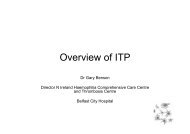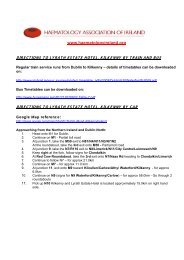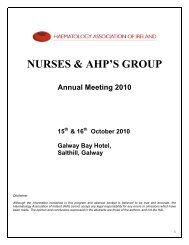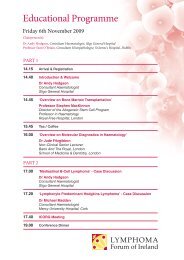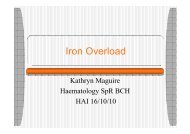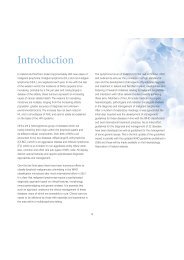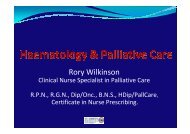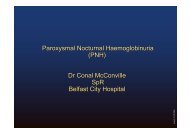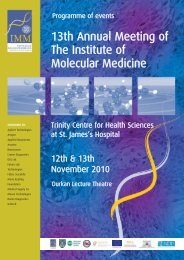Guidelines on Diagnosis and Treatment of Malignant Lymphomas
Guidelines on Diagnosis and Treatment of Malignant Lymphomas
Guidelines on Diagnosis and Treatment of Malignant Lymphomas
Create successful ePaper yourself
Turn your PDF publications into a flip-book with our unique Google optimized e-Paper software.
Persistent / progressive disease or<br />
disease requiring specific anti-lymphoma<br />
treatment at diagnosis:<br />
Additi<strong>on</strong>al treatment is needed for persistant or progressive<br />
disease, infiltrati<strong>on</strong> <strong>of</strong> the muscularis mucosa, nodal involvement<br />
or presence <strong>of</strong> t(11;18).<br />
Management includes chemotherapy +/- Rituximab, with<br />
Chlorambucil being the comm<strong>on</strong>est therapy used in gastric<br />
MALT lymphomas at a dose <strong>of</strong> 6mg/m2/day for 14 days q 28<br />
days for 6-12 cycles (2 cycles bey<strong>on</strong>d CR). Rituximab therapy<br />
is active in this lymphoma, though there is no c<strong>on</strong>sensus<br />
about when it should be used. Loco-regioal RT <strong>of</strong> 30Gy<br />
(20 fracti<strong>on</strong>s) RT to stomach <strong>and</strong> adjacent lymph nodes has<br />
been advocated as sec<strong>on</strong>d line therapy.<br />
Resp<strong>on</strong>se Evaluati<strong>on</strong> <strong>and</strong> Follow Up<br />
Follow-up is essential following HP eradicati<strong>on</strong> in early stage<br />
disease. Serial endoscopy with biopsy is recommended to ensure<br />
eradicati<strong>on</strong> <strong>of</strong> HP <strong>and</strong> disappearance <strong>of</strong> lymphoma for:<br />
■<br />
■<br />
■<br />
2-3 m<strong>on</strong>ths after antibiotic therapy<br />
Twice annually for 2 years at least<br />
Annually thereafter<br />
If H.pylori has not been eradicated by 2 m<strong>on</strong>ths, alternative<br />
sec<strong>on</strong>d line antibiotic therapy should be given. If there is<br />
tumour progressi<strong>on</strong> at any stage, chemotherapy +/-radiotherapy<br />
should be given.<br />
Patients who are well <strong>and</strong> showing stable disease or partial<br />
resp<strong>on</strong>ses should not be deemed 'failures' until 1 year after<br />
treatment as resp<strong>on</strong>ses can be slow, unless the patient has poor<br />
prognostic features (tumour invasi<strong>on</strong> bey<strong>on</strong>d the submucosa, H.<br />
pylori negative patients, t(1;14)(p22;q21), t(11;18)(q21;q21),<br />
Bcl-10 nuclear expressi<strong>on</strong>). These patients should be deemed<br />
'failures' to H.pylori eradicati<strong>on</strong> if there is no PR at 2 m<strong>on</strong>ths or<br />
CR at 6 m<strong>on</strong>ths.<br />
N<strong>on</strong>-gastric MALT lymphomas behave in an indolent<br />
fashi<strong>on</strong> <strong>and</strong> should be treated in the same way as Gastric<br />
MALT <strong>Lymphomas</strong> but without H. pylori eradicati<strong>on</strong>. Stage I<br />
<strong>and</strong> II disease may be treated with observati<strong>on</strong> post surgical<br />
resecti<strong>on</strong>, chemotherapy or locoregi<strong>on</strong>al radiotherapy. Stage III<br />
<strong>and</strong> IV disease (uncomm<strong>on</strong>) should be treated as for other<br />
indolent lymphomas, unless transformati<strong>on</strong> to high-grade<br />
histology is dem<strong>on</strong>strated.<br />
24



